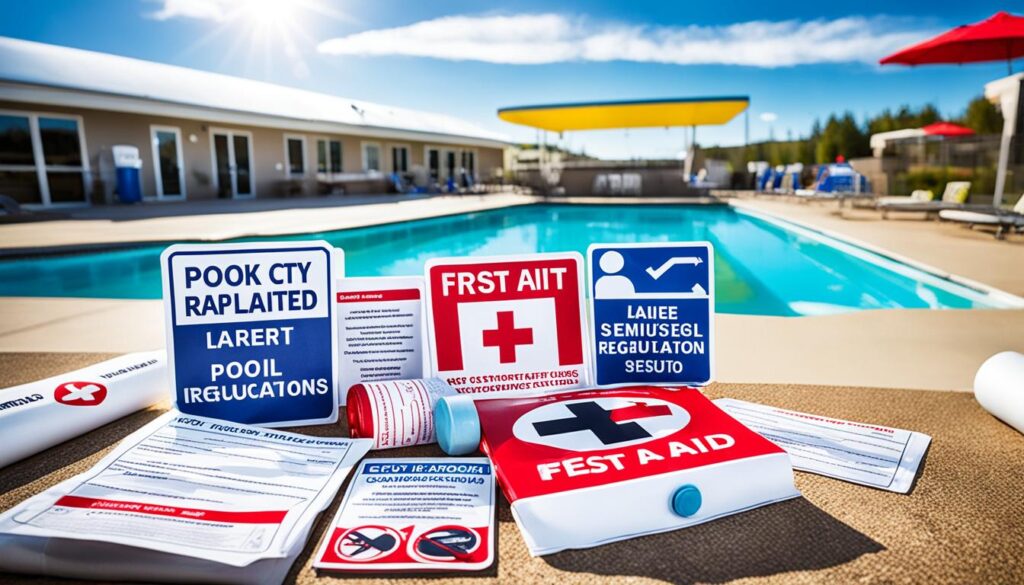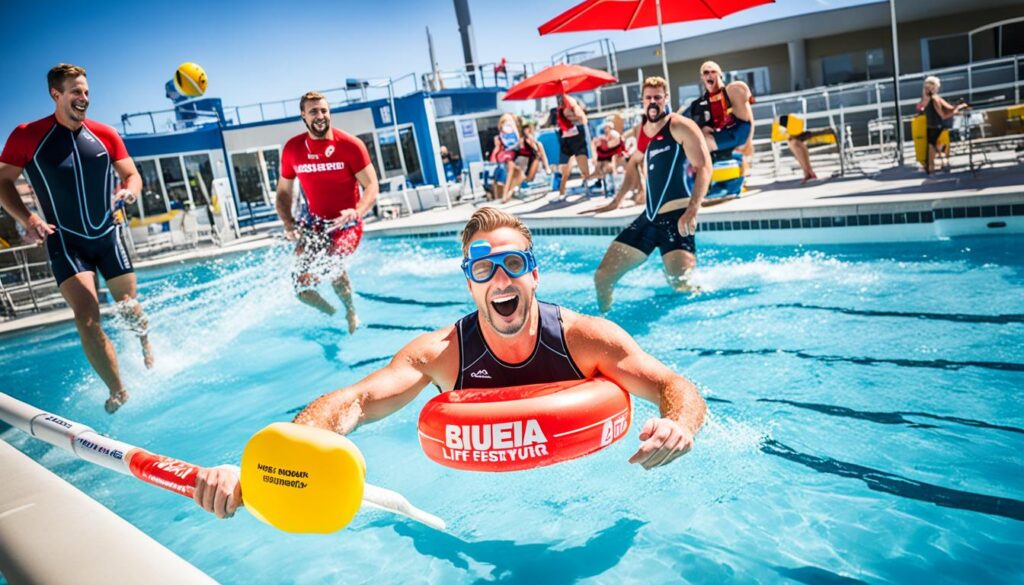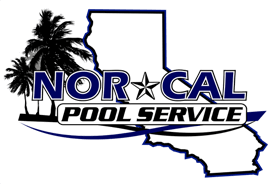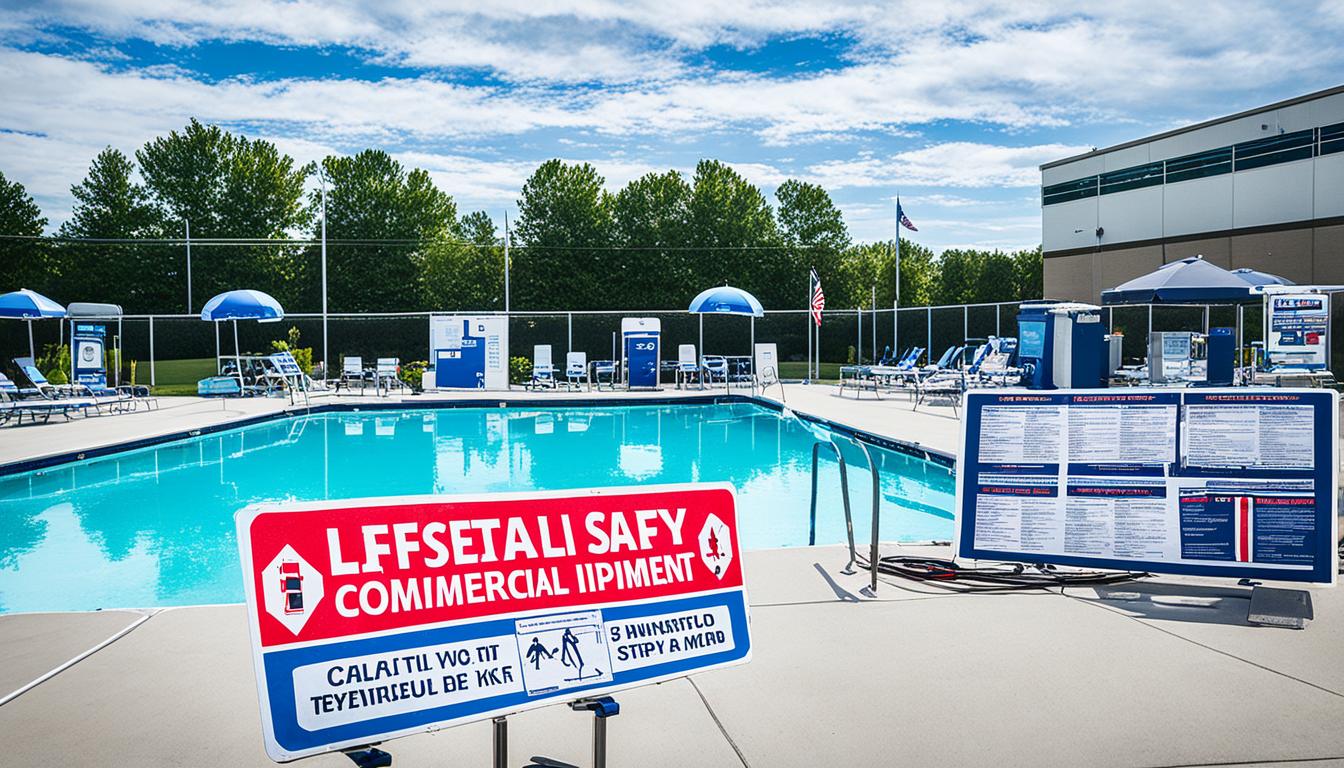Commercial pool safety is a big deal, not just a splash in the water. It’s vital to follow public pool rules and keep up with swimming pool safety standards. Drowning is a leading cause of injury death in these pools, showing how important safety steps are1.
Keeping pools safe is more than just clean water. It means looking after safety in many ways, like handling chemicals right, checking equipment often, and following strict rules. Pool owners should make sure lifeguards are well-trained and safety plans are in place for everyone’s safety2.
Important safety gear like U.S. Coast Guard approved life vests, rescue tools, and pool alarms are key to stopping accidents and saving lives13. It’s very important to have these items ready and working well.
Keeping the water safe is also crucial. Automated systems for checking chemicals help keep the water right, and good filters keep it clear and clean12. If the water isn’t clear, it’s best to close the pool until it’s fixed.
Key Takeaways
- Commercial pools must follow strict safety rules
- Stopping drowning is a top goal in pool safety
- Checking equipment often is key to safety
- Handling chemicals and keeping water clean is important
- Having safety gear and trained staff is key for emergencies
- Clear safety rules and signs help avoid accidents
Understanding Commercial Pool Safety Regulations
Keeping commercial pools safe is very important. We need to follow many rules to keep swimmers safe and prevent accidents. It’s important to know these rules to keep the pool safe for everyone.
Federal and State Guidelines
Federal and state rules are the base of pool safety. They cover things like water quality and how the pool is built. Most pool accidents happen because of missing safety steps4. We must keep up with these rules to protect everyone.
Local Health Department Requirements
Local health departments have their own rules that fit the community’s needs. These rules might include what the pH level and chlorine levels should be, and how often to test the water. The ideal pH for pool water is between 7.2 to 7.8, and chlorine levels should be 1 to 3 parts per million5. Checking these levels often is crucial.

Industry Standards and Best Practices
Industry standards give us more advice on how to prevent drowning and handle emergencies. They suggest what safety gear to use, how to train staff, and what emergency steps to take. Having signs up can help prevent accidents, and checking the pool regularly is a must6. Following these tips makes the pool safer for everyone.
Commercial pools must follow local safety laws to meet safety standards5. Using both rules and best practices together is key to managing pool safety well.
Pool Safety Tips for Commercial Pools
We know how important it is to keep commercial pools safe. It’s key to stop accidents and make sure everyone has a good time. Let’s look at some key tips to make pools safer.
First, keeping the water chemistry right is crucial. Commercial pools should have chlorine levels between 1-3 ppm and pH levels between 7.2-7.8. It’s a good idea to check the chemicals at least twice a day, more often when it’s busy7. It’s important for staff and swimmers to follow the rules for handling pool chemicals.

Having a lifeguard on duty is also very important. A lifeguard can cut drowning risks by up to 50%8. Making sure lifeguards are well-trained for emergencies is key.
Designing pools to be safe is also crucial. Pools should have surfaces that don’t slip, clear signs showing depth, and easy ways to get in. There should be Coast Guard-approved life jackets available7. Also, it’s vital to have fences that are at least 48 inches high with gates that close by themselves and don’t open towards the pool9.
| Safety Measure | Recommendation |
|---|---|
| Chlorine Levels | 1-3 ppm |
| pH Levels | 7.2-7.8 |
| Chemical Testing | At least twice daily |
| Fence Height | Minimum 48 inches |
By following these safety steps, we can make pools safe and fun for everyone. Pool safety is a big job that needs us to always be careful and follow the best practices798.
Implementing Effective Barriers and Access Control
We know how vital barriers and access control are for keeping pools safe. These steps are crucial for stopping drowning in pools. They help keep commercial pool areas secure.
Fencing and Gate Requirements
Having the right fence is key to pool safety. The ASTM F2286-16 Pool Fences standard sets important rules. Gates must swing away from the pool and have a clear area of at least 20 inches around them. It’s also key to have self-closing and self-latching gates10.
Alarm Systems and Safety Covers
Pool alarms are crucial for safety. They include surface wave detection, subsurface sensors, and gate alarms11. Safety covers must meet ASTM F1346-91 standards and can hold over 485 lbs. They stop people from getting in or getting trapped10. These covers can hold the weight of many adults, acting as a barrier against falls11.
Supervision and Lifeguard Protocols
Having the right supervision is key in pools. Certified Pool/Spa Operator® Certification (CPO®) courses teach professionals a lot about pool safety and how to run them well11. It’s also good to have swim classes for kids to make them more comfortable in the water and lower the chance of accidents10.
| Safety Measure | Description | Benefit |
|---|---|---|
| Fencing | 48-inch minimum height | Prevents unauthorized access |
| Gate Alarms | Alerts when gates are opened | Enhances access control |
| Safety Covers | ASTM F1346-91 compliant | Prevents accidental falls |
| Lifeguard Training | CPO® certification | Ensures professional supervision |
Water Quality Management and Chemical Safety
Keeping the water in commercial pools safe is key. We’ll look at important steps like testing, handling chemicals, and keeping the right pH and chlorine levels.
Proper Water Testing Procedures
Testing the water often is a must for safety. We use test strips, digital testers, or liquid kits every day12. It’s important to keep chlorine between 1-3 parts per million and pH between 7.2 and 7.813.
Chemical Handling and Storage Guidelines
Handling pool chemicals safely is crucial. In 2012, over 4,000 people got hurt from pool chemicals14. We keep chemicals dry and well-ventilated and use the right gear when handling them. Storing chemicals right stops harmful fumes and fires14.
Maintaining Optimal pH and Chlorine Levels
Keeping the pH and chlorine right stops harmful germs. We shock the pool as needed, based on how busy it is and the weather13. For really busy times or after lots of rain, we adjust the chlorine12. Some places use saltwater generators, which can cut chlorine use by half12.
| Parameter | Optimal Range | Frequency of Check |
|---|---|---|
| Chlorine | 1-3 ppm | Daily |
| pH | 7.2-7.8 | Daily |
| Water Replacement | Partial | Weekly to Monthly |
Emergency Preparedness and Response Protocols
At commercial pool facilities, we focus on safety with detailed pool emergency response plans. Our lifeguards keep improving their skills in watching, saving lives, and handling emergencies15. They stand at high places or by the pool to see everyone clearly, changing spots every 30 minutes to stay sharp15.
Our emergency plan lists who does what, who to call in an emergency, how to get out safely, and where to meet after an emergency16. A key person makes and leads this plan, making sure it follows local pool safety laws16. Lifeguards learn the pool’s layout, how to quickly get rescue gear, and where exits and gear are, to act fast in emergencies17.
We plan for different emergencies like water problems, sudden sickness, natural disasters, fires, and chemical spills17. Everyone knows their job and how to call for help quickly17. After an emergency, we write detailed reports and check all gear before opening again, keeping everyone safe17.
FAQ
What federal and state guidelines must commercial pool facilities follow?
What industry standards and best practices should commercial pools adhere to?
What are the fencing and gate requirements for commercial pools?
What supervision and lifeguard protocols should be in place at commercial pools?
How should commercial pools maintain proper water quality and chemical safety?
What emergency preparedness and response protocols should commercial pools have in place?
Source Links
- Pool Safety Devices Your Commercial Pool Facility Needs
- Keeping Your Commercial Pool Safe – Continental Pools | Commercial and Residential Services
- Pool Safety Checklist
- Understanding the Importance & Basics of Pool Safety
- Commercial Pool Safety Tips for Businesses
- 4 Safety Tips for Your Commercial Pool – Pools of Fun
- 5 Ways to Keep Your Commercial Pool Safe and Secure – American Pool
- Pool Safety – Continental Pools | Commercial and Residential Services
- Swimming Pool Safety Tips – Business Resource Center
- The ABC’s of Pool Safety
- Pool Safety Devices Your Commercial Pool Facility Needs
- Commercial Swimming Pool Supplies for Safe Swimming
- Tips for Operating Your Commercial Pool for Healthy Swimming
- Commercial Pool Cleaning – The Importance of Chemical Safety
- Pools & Aquatic Centers – Pool Area Safety Policy Template
- How to Implement A Pool Emergency Action Plan At Your Facility
- Developing Emergency Response Plans As a CPO®

